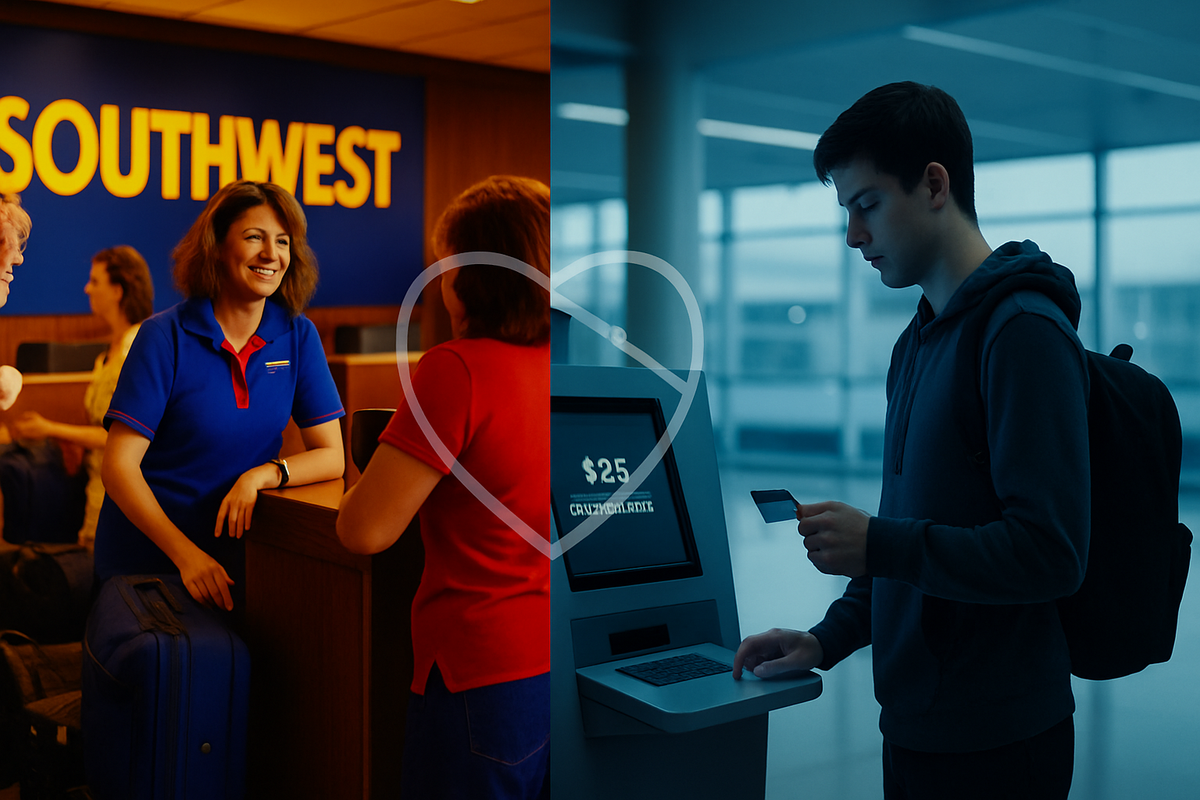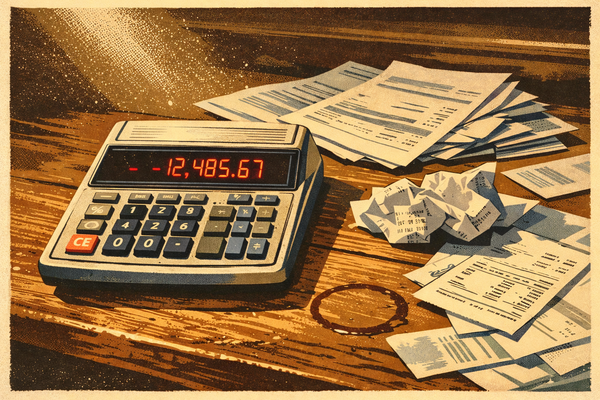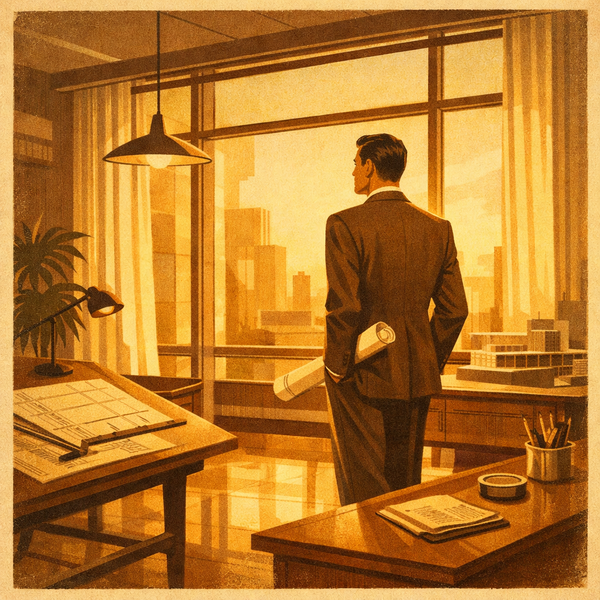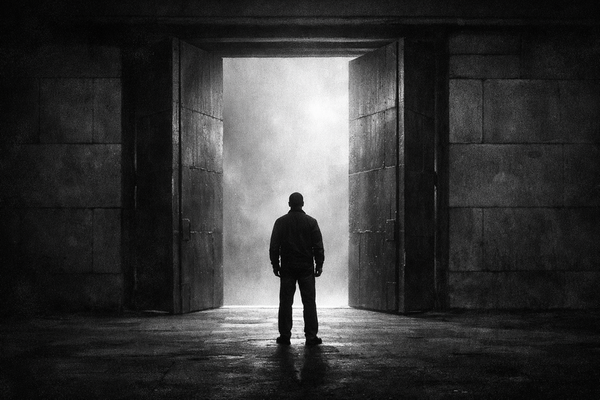Love, Laughter, Logic: Why Southwest's New Direction Could Ground Its Soul
Southwest Airlines ended its 54-year "bags fly free" policy on May 28th, 2025, trading a vision that inspired loyalty for a business model that generates revenue and in doing so, committed the fastest way to ruin a historic brand: betrayal.

"The essential difference in service is not machines or 'things.' The essential difference is minds, hearts, spirits, and souls." — Herb Kelleher, founder of Southwest Airlines
For two decades, I was part of what I'd call the cult of kindness. I flew Southwest religiously, not because it was cheapest, though it often was, but because it felt different. Human. The flight attendants told jokes. Everyone scrambled for seats in that chaotic but somehow democratic way. The bags flew free. The experience was simple. I trusted them completely.
Last month, something broke. Not my luggage. My faith.
Standing at the ticket counter watching a wonderful agent named Maria try to fix what the system had done to me, I realized the thing I loved doesn't exist anymore. The system charged me twice for my bags, once per flight segment, as if my journey from Point A to Point C somehow required two separate bag fees instead of one. Maria called support. They couldn't help. In the end, she let my second bag go free and I paid $75 for the first one, a compromise born of her humanity and the system's inflexibility.
To add insult to injury, the system didn't give her enough characters in the notes field to properly document the problem.
Think about that. They built a new system to extract more money from customers, but they didn't build it well enough to let their own people explain what went wrong. This wasn't a glitch. This was the new Southwest, and it arrived on May 28th, 2025, when the airline ended its 54-year "bags fly free" policy.
Thirty-five dollars for the first bag. Forty-five for the second. Assigned seating coming in 2026. Basic economy fares with restrictions. All announced in rapid succession after activist investor Elliott Investment Management took a $1.9 billion stake and demanded changes.
They're still using the same planes, still painting them the same colors, but what once felt human now feels transactional. And it feels like betrayal. Not just disappointment or inconvenience. Betrayal. Because for decades, Southwest made us a promise, and we built our loyalty on that promise. We chose them over and over, not because they were perfect, but because we believed they were different. We believed in what they stood for.
That's what makes this hurt. This is what happens when you lose vision.
Henry Ford said customers could have any color they wanted, as long as it was black. People joke about that now, but Ford understood something profound: simplicity scales. Complexity kills.
Southwest built an empire on that principle. One type of aircraft. No assigned seating. No first class. No baggage fees. This wasn't deprivation. It was genius. Every choice they didn't offer was a choice they didn't have to support, manage, or explain.
They stripped away everything except the essential promise: we'll get you there, treat you well, and won't nickel and dime you. That clarity was their brand. That simplicity was their advantage. And most importantly, it was their covenant with customers. Break that covenant, and you don't just lose business. You lose trust. And trust, once broken, is the fastest way to ruin and devalue a historic brand.
But someone looked at revenue optimization spreadsheets and saw United and American collecting billions in baggage fees. Someone asked, "Why are we leaving money on the table?" They forgot that sometimes the money you don't take is the most valuable investment you can make. They forgot that brand value isn't built on what you charge. It's built on what you stand for.
So in 2025, they started adding complexity. Baggage fees. Basic economy. Assigned seating coming next year. Premium seats with extra legroom. What was once a single, powerful promise became a confusing menu that looks suspiciously like every other airline they used to be different from.
You can't spreadsheet charm. You can't automate soul. And you definitely can't put a price on trust.
Maria wasn't just dealing with a bad policy. She was trapped inside a badly designed system implementing that policy. She tried to help. She called support. Support couldn't override the logic. So she did what Southwest people have always done: she found a way to make it right, working around the system instead of being empowered by it.
But the system didn't even give her enough space to document what she'd done and why. The people who designed this new revenue generating system thought about how to capture fees, but they didn't think about how to capture context. They built a system for extraction, not for service.
The frontline crew are still pure gold. They're still trying to maintain that Southwest spirit, still making jokes on the PA system, still going above and beyond. But they're stuck inside a system that's rusting around them. In the same year Southwest added baggage fees, they also laid off 1,750 corporate employees, the first mass layoffs in company history.
When your best people have to work around your systems instead of being empowered by them, you've lost the vision of what the company was meant to be. When your customers feel betrayed by the very policies you're implementing, you're not just changing your business model. You're destroying your brand.
Here's what Southwest understood that its current leadership has forgotten: the space between transactions is where loyalty is built. It's not the purchase itself that creates devotion. It's what happens in the margins. The extra minute of conversation. The unexpected flexibility. The sense that you're dealing with humans who care rather than a machine optimized for extraction.
Southwest didn't try to extract value from every microsecond of the customer experience. They left room for humanity. A flight attendant could take time to joke with passengers. A ticket agent could waive a fee without triggering corporate alarm bells. The company trusted its people, and that trust created space for genuine connection. That connection created loyalty. That loyalty created brand value.
Now they've filled that space with fees. Every interaction has a price attached. The airline that famously trademarked "Bags Fly Free" now charges $35 for what used to be a promise, and the system that charges those fees doesn't even work properly yet.
The bags flying free wasn't a cost center. It was the embodiment of a vision. The open seating wasn't chaos. It was democracy in action. The simplicity wasn't limitation. It was clarity of purpose. And all of it together was a brand promise that made Southwest worth more than the sum of its routes and planes.
They had something priceless, and they traded it for something they could count. Southwest estimates these changes will generate $1.5 billion in annual seat revenue. They also projected potential losses of $1.8 billion in market share. They're betting the increased revenue will outweigh the customers they lose.
But they're not accounting for what you can't measure on a spreadsheet: the erosion of brand equity. The feeling of betrayal. The stories people tell about how Southwest used to be different and now it's just like everyone else. That's the cost no analyst factored in. That's the fastest way to ruin and devalue a historic brand.
Herb Kelleher stepped down as CEO in 2001 and left the chairman role in 2008. He died in 2019. The culture he built survived for years after he left, through leadership changes, through mounting competitive pressures, through a 2022 operational meltdown. But vision without its keeper is vulnerable. Brand promises without believers become negotiable.
Kelleher knew that the essential difference in service wasn't machines or things. It was minds, hearts, spirits, and souls. He built an airline on love, laughter, and logic, in that order. The numbers had to support the humanity, not replace it. That was the vision. That was the brand promise. That's what made Southwest valuable.
In 2025, seventeen years after Kelleher left leadership, that vision finally died. When activist investors came calling with spreadsheets showing how much money Southwest was "leaving on the table," there was no longer a founder's voice strong enough to say: "That's not money we're leaving on the table. That's the investment that makes us different. That's what makes our brand worth something."
CEO Bob Jordan called the changes "exciting." The former board chairman praised the "courage and conviction to fundamentally change ingrained aspects of their business model."
But changing your business model and betraying your brand promise are not the same thing. One is adaptation. The other is abandonment.
When vision leaves the cockpit, the numbers start flying the plane. And numbers, left to themselves, will always choose extraction over connection, optimization over relationship, revenue over reputation. The spreadsheet sees opportunities where the visionary saw obligations. This is how you betray a brand. This is how you devalue what took decades to build.
Southwest didn't just lose a policy or a perk. They lost the clarity of purpose that made those policies matter. They forgot why they existed in the first place. They traded a vision that inspired loyalty for a business model that generates revenue and implements it so poorly that their own people can't make it work right.
Maria did everything right. She tried to help. She called for backup. She found a workaround. She couldn't even properly document it. Not because she wasn't capable, but because the system wasn't built for people like her anymore. It was built for revenue capture, not problem solving. Not for honoring promises, but for breaking them profitably.
I'll always love what Southwest was. That Southwest died on May 28th, 2025, not with a bang but with a baggage fee and a notes field that ran out of characters. With a brand promise broken and customers feeling betrayed.
Maybe the next generation of founders will understand: vision isn't a luxury. It's the only thing that keeps you from becoming exactly what you swore you'd never be. Culture is fragile. Values evaporate. Brand promises can be broken in a moment. But vision, clear and uncompromising and fiercely protected, is what stands between a company with soul and just another commodity in a crowded market.
Southwest forgot that simplicity was their vision, not their constraint. That the space between transactions was where loyalty lived. That love, laughter, and logic only work in that order. That the essential difference in service will always be minds, hearts, spirits, and souls, not machines or things. That breaking promises is the fastest way to ruin and devalue a historic brand.
More isn't always better. Less was always the secret. Herb knew that. For seventeen years after he left, the culture remembered.
But culture without vision is just nostalgia. Brand equity without brand promise is just momentum. And momentum doesn't survive when customers feel betrayed.
This is what happens when you lose vision. You don't just lose your way. You lose your soul. You lose your brand. And you build systems that can't even document their own failures while they extract fees from customers who once believed in you.
The betrayal is complete. The brand, devalued. The vision, gone.




